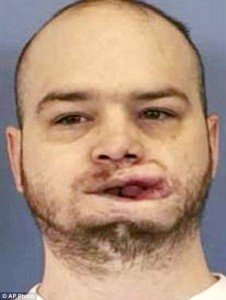 Lawyers are trying to stave off a man’s pending execution by arguing that it would be cruel and unusual punishment because they say he is mentally ill.
Lawyers are trying to stave off a man’s pending execution by arguing that it would be cruel and unusual punishment because they say he is mentally ill.
Edwin Hart Turner, 38, is on death row after being found guilty of killing two men during an armed robbery of a gas station in Carrolton, Mississippi in 1995.
His attorneys say that Turner has a history of mental illness in his family and has long struggled with depression. He is disfigured after shooting himself in the face in a failed suicide attempt when he was 18,
Even though his mental competence has been tested a number of times, his lawyers hope that another evaluation will prove that it would be wrong to execute him because of his illness.
If they do, it would be a ground-breaking turn, as it is illegal to execute people who are mentally retarded, but it is legal to execute people who are mentally ill.
‘The Supreme Court has not decided the question of whether a prisoner with a severe mental disorder or disability which significantly impairs that person’s ability to rationally process information, to make reasonable judgments and to control their impulses, whether people in that category can be executed,’ Turner’s lawyer Jim Craig said.
‘So we’re asking the Supreme Court to establish that it would be contrary to consensus of moral values, that it would be cruel and unusual punishment, to execute someone with severe mental illness,’ Mr Craig told MSNBC.
Government officials disagree with the move, saying that it is simply a tactic to have his February 8 execution date delayed.
‘He has raised the issue of mental health problems at every level and has been denied relief at every turn,’ said Mississippi Attorney General Jim Hood.
‘We argue that his mental health claims have been fully addressed, and that this present action is nothing more than an attempt to re-litigate a claim that has been properly adjudicated at every turn,’ Mr Hood continued.
During the attempted robbery, Turner and his accomplice, Paul Murrell Stewart, shot the gas station attendant in the face and a customer in the head.
Stewart pleaded guilty to capital murder and was sentenced to life in jail without parole.
‘These crimes were brutal and nothing short of cowardly,’ Mr Hood has said about the case.
Turner’s lawyers argue that his personal and hereditary battle with depression and mental illness should allow him to be considered unfit for execution.
He tried to kill himself with a rifle at age 18 but the gun’s barrel slipped and left him permanently disfigured. Five years later, he tried to slit his wrists and was hospitalized.
His mother also attempted suicide twice and his grandmother and great-grandmother were committed to hospitals under care of the state. Suicide isn’t only on his maternal side either, as many speculate that the dynamite explosion that killed his father was actually self-inflicted.
His lawyer said that after Turner was hospitalized from his suicide attempt, he was misdiagnosed and that prompted the murder of the two men at the gas station.
‘He had been committed to Whitfield in the summer of 1995 and released, on Prozac, in October of that year,’ Mr Craig said.
‘Tragically, with the information the scientific and medical community now have, he would not have been released in our present time with a Prozac prescription. He went into a manic and psychotic spiral which ended in the deaths of Mr. Brooks and Mr. Curry.’
